List of United States Supreme Court cases, volume 38
| Supreme Court of the United States | |
|---|---|
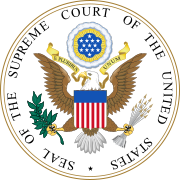 | |
| Established | March 4, 1789[1] |
| Location | Washington, D.C. |
| Coordinates | 38°53′26″N 77°00′16″W / 38.89056°N 77.00444°WCoordinates: 38°53′26″N 77°00′16″W / 38.89056°N 77.00444°W |
| Composition method | Presidential nomination with Senate confirmation |
| Authorized by | Constitution of the United States, Art. III, § 1 |
| Judge term length | life tenure, subject to impeachment and removal |
| Number of positions | 9 (by statute) |
| Website | supremecourt |
| Chief Justice of the United States | |
| Currently | John Roberts |
| Since | September 29, 2005 |
| This article is part of the series on the |
| Supreme Court of the United States |
|---|
 |
| The Court |
|
| Current membership |
|
| Lists of justices |
|
| Court functionaries |
|
|
| Constitutional law of the United States |
|---|
 |
| Overview |
|
| Principles |
|
| Government structure |
|
| Individual rights |
|
| Theory |
|
This is a list of the 49 cases reported in volume 38 (13 Pet.) of United States Reports, decided by the Supreme Court of the United States from January 1839 to March 1839.[2]
Nominative reports[]
In 1874, the U.S. government created the United States Reports, and retroactively numbered older privately-published case reports as part of the new series. As a result, cases appearing in volumes 1–90 of U.S. Reports have dual citation forms; one for the volume number of U.S. Reports, and one for the volume number of the reports named for the relevant reporter of decisions (these are called "nominative reports").
Richard Peters, Jr.[]
Starting with the 26th volume of U.S. Reports, the Reporter of Decisions of the Supreme Court of the United States was Richard Peters, Jr. Peters was Reporter of Decisions from 1828 to 1843, covering volumes 26 through 41 of United States Reports which correspond to volumes 1 through 16 of his Peter's Reports. As such, the dual form of citation to, for example, Anthony v. Butler is 38 U.S. (13 Pet.) 423 (1839).
Justices of the Supreme Court at the time of 38 U.S. (13 Pet.)[]
The Supreme Court is established by Article III, Section 1 of the Constitution of the United States, which says: "The judicial Power of the United States, shall be vested in one supreme Court . . .". The size of the Court is not specified; the Constitution leaves it to Congress to set the number of justices. Under the Judiciary Act of 1789 Congress originally fixed the number of justices at six (one chief justice and five associate justices).[3] Since 1789 Congress has varied the size of the Court from six to seven, nine, ten, and back to nine justices (always including one chief justice). When the cases in 38 U.S. (13 Pet.) were decided, the Court comprised these nine justices:
| Portrait | Justice | Office | Home State | Succeeded | Date confirmed by the Senate (Vote) |
Tenure on Supreme Court |
|---|---|---|---|---|---|---|
 |
Roger B. Taney | Chief Justice | Maryland | John Marshall | March 15, 1836 (29–15) |
March 28, 1836 – October 12, 1864 (Died) |
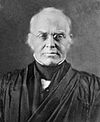
|
Joseph Story |
Associate Justice | Massachusetts | William Cushing | November 18, 1811 (Acclamation) |
February 3, 1812 – September 10, 1845 (Died) |
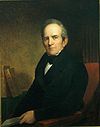 |
Smith Thompson | Associate Justice | New York | Henry Brockholst Livingston | December 9, 1823 (Acclamation) |
September 1, 1823 – December 18, 1843 (Died) |
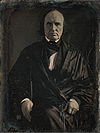 |
John McLean | Associate Justice | Ohio | Robert Trimble | March 7, 1829 (Acclamation) |
January 11, 1830 – April 4, 1861 (Died) |
 |
Henry Baldwin | Associate Justice | Pennsylvania | Bushrod Washington | January 6, 1830 (41–2) |
January 18, 1830 – April 21, 1844 (Died) |
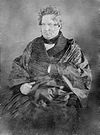 |
James Moore Wayne | Associate Justice | Georgia | William Johnson | January 9, 1835 (Acclamation) |
January 14, 1835 – July 5, 1867 (Died) |
 |
Philip P. Barbour | Associate Justice |
Virginia |
Gabriel Duvall | March 15, 1836 (30–11) |
May 12, 1836 – February 25, 1841 (Died) |
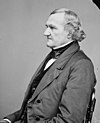 |
John Catron | Associate Justice | Tennessee | newly-created seat | March 8, 1837 (28–15) |
May 1, 1837 – May 30, 1865 (Died) |
 |
John McKinley | Associate Justice | Alabama | newly-created seat | September 25, 1837 (Acclamation) |
January 9, 1838 – July 19, 1852 (Died) |
Citation style[]
Under the Judiciary Act of 1789 the federal court structure at the time comprised District Courts, which had general trial jurisdiction; Circuit Courts, which had mixed trial and appellate (from the US District Courts) jurisdiction; and the United States Supreme Court, which had appellate jurisdiction over the federal District and Circuit courts—and for certain issues over state courts. The Supreme Court also had limited original jurisdiction (i.e., in which cases could be filed directly with the Supreme Court without first having been heard by a lower federal or state court). There were one or more federal District Courts and/or Circuit Courts in each state, territory, or other geographical region.
Bluebook citation style is used for case names, citations, and jurisdictions.
- "C.C.D." = United States Circuit Court for the District of . . .
- e.g.,"C.C.D.N.J." = United States Circuit Court for the District of New Jersey
- "D." = United States District Court for the District of . . .
- e.g.,"D. Mass." = United States District Court for the District of Massachusetts
- "E." = Eastern; "M." = Middle; "N." = Northern; "S." = Southern; "W." = Western
- e.g.,"C.C.S.D.N.Y." = United States Circuit Court for the Southern District of New York
- e.g.,"M.D. Ala." = United States District Court for the Middle District of Alabama
- "Adm." = Admiralty Court (a federal court)
- "Ct. Cl." = United States Court of Claims
- "Ct. Com. Pl." = Court of Common Pleas (a state court)
- The abbreviation of a state's name alone indicates the highest appellate court in that state's judiciary at the time.
- e.g.,"Pa." = Supreme Court of Pennsylvania
- e.g.,"Me." = Supreme Judicial Court of Maine
List of cases in 38 U.S. (13 Pet.)[]
| Case Name | Page & year | Opinion of the Court | Concurring opinion(s) | Dissenting opinion(s) | Lower court | Disposition of case |
|---|---|---|---|---|---|---|
| Woodward v. Brown | 1 (1839) | McLean | none | none | C.C.D.C. | affirmed |
| Whiting v. Bank of the U.S. | 6 (1839) | Story | none | none | C.C.D. Ky. | affirmed |
| van Ness v. Bank of the U.S. | 17 (1839) | Taney | none | none | C.C.D.C. | affirmed |
| Rhode Island v. Massachusetts | 23 (1839) | Taney | none | none | original jurisdiction | motion to order answer denied |
| Smith v. Richards | 26 (1839) | Barbour | none | Story | C.C.S.D.N.Y. | affirmed |
| Ross v. Duval | 45 (1839) | McLean | none | none | C.C.E.D. Va. | reversed |
| Andrews v. Pond | 65 (1839) | Taney | none | none | C.C.S.D. Ala. | reversed |
| United States v. Levy | 81 (1839) | Wayne | none | none | C.C.D. Ky. | affirmed |
| United States v. Drummond | 84 (1839) | Wayne | none | none | Fla. Super Ct. | reversed |
| United States v. Burgevin | 85 (1839) | Wayne | none | none | Fla. Super Ct. | reversed |
| United States v. Arredondo's Heirs I | 88 (1839) | Wayne | none | none | Fla. Super Ct. | affirmed |
| Bradley v. Washington, A. & G.S.P. Co. | 89 (1839) | Barbour | none | Thompson, Catron, Story | C.C.D.C. | reversed |
| Bank of the U.S. v. Lee | 107 (1839) | Catron | none | none | C.C.D.C. | affirmed |
| Bank of the U.S. v. Peter | 123 (1839) | McLean | none | none | C.C.D.C. | reversed |
| King v. Thompson | 128 (1839) | Catron | none | none | C.C.D.C. | affirmed (part); reversed (part) |
| United States v. Arredondo's Heirs II | 133 (1839) | Wayne | none | none | Fla. Super Ct. | affirmed |
| Wallace v. M'Connell | 136 (1839) | Thompson | none | none | S.D. Ala. | affirmed |
| Reed's Lessee v. Marsh | 153 (1839) | Taney | none | none | Ohio | dismissed for want of jurisdiction |
| Ocean Ins. Co. v. Polleys | 157 (1839) | Story | none | none | Me. | dismissed for want of jurisdiction |
| Walker v. Parker | 166 (1839) | McLean | none | none | C.C.D.C. | affirmed |
| United States v. Hardyman | 176 (1839) | McLean | none | none | C.C.E.D. Va. | remanded to divided lower court |
| Stokes v. Saltonstall | 181 (1839) | Barbour | none | none | C.C.D. Md. | affirmed |
| Clark v. Smith | 195 (1839) | Catron | none | none | C.C.D. Ky. | reversed |
| Downes & Co. v. Church | 205 (1839) | Story | none | none | C.C.D. Miss. | remanded to divided lower court |
| Stein v. Bowman | 209 (1839) | McLean | none | Baldwin | E.D. La. | reversed |
| Ex parte Hennen | 225 (1839) | Taney | none | none | C.C.D. La. | rule discharged |
| Bend v. Hoyt | 263 (1839) | Story | none | none | C.C.S.D.N.Y. | remanded to divided lower court |
| Ex parte Hoyt | 279 (1839) | Story | Baldwin | none | S.D.N.Y. | mandamus denied |
| Hardy v. Hoyt | 292 (1839) | Story | none | none | C.C.S.D.N.Y. | remanded to divided lower court |
| van Ness v. Hyatt | 294 (1839) | Barbour | none | none | C.C.D.C. | affirmed |
| Moore v. Bank of the Metropolis | 302 (1839) | Thompson | none | none | C.C.D.C. | affirmed |
| M'Elmoyle ex rel. Bailey v. Cohen | 312 (1839) | Wayne | none | none | C.C.D. Ga. | remanded to divided lower court |
| Columbian Ins. Co. v. Ashby | 331 (1839) | Story | none | none | C.C.D.C. | affirmed |
| Moncure v. Dermott | 345 (1839) | McKinley | none | none | C.C.D.C. | reversed |
| Story v. Livingston | 359 (1839) | Wayne | none | none | E.D. La. | affirmed |
| Wilcox v. Hunt | 378 (1839) | McKinley | none | none | E.D. La. | affirmed |
| Lupton v. Janney | 381 (1839) | Story | none | none | C.C.D.C. | affirmed |
| The Brig Sarah Ann | 387 (1839) | Wayne | none | none | C.C.D. Mass. | affirmed |
| Ex parte Whitney | 404 (1839) | Story | none | none | E.D. La. | mandamus denied |
| Emerson's Heirs v. Hall | 409 (1839) | McLean | none | none | La. | reversed |
| Williams v. Suffolk Ins. Co. | 415 (1839) | McLean | none | none | C.C.D. Mass. | remanded to divided lower court |
| Anthony v. Butler | 423 (1839) | McLean | none | none | C.C.D.R.I. | affirmed |
| Bagnell v. Broderick | 436 (1839) | Catron | none | McLean | C.C.D. Mo. | affirmed |
| Keene v. Whittaker | 459 (1839) | Wayne | none | none | E.D. La. | dismissed |
| Carr v. Hoxie | 460 (1839) | Story | none | none | C.C.D.R.I. | dismissed |
| Burton v. Smith | 464 (1839) | Barbour | none | none | C.C.E.D. Va. | affirmed |
| Meredith v. United States | 486 (1839) | Story | none | none | C.C.D. Md. | affirmed |
| Wilcox v. Jackson | 498 (1839) | Barbour | none | none | Ill. | reversed |
| Bank of Augusta v. Earle | 519 (1839) | Taney | Baldwin | McKinley | C.C.S.D. Ala. | reversed |
Notes and references[]
- ^ Lawson, Gary; Seidman, Guy (2001). "When Did the Constitution Become Law?". Notre Dame Law Review. 77: 1–37.
- ^ Anne Ashmore, DATES OF SUPREME COURT DECISIONS AND ARGUMENTS, Library, Supreme Court of the United States, 26 December 2018.
- ^ "Supreme Court Research Guide". Georgetown Law Library. Retrieved April 7, 2021.
See also[]
- Certificate of division
External links[]
- [1] Case reports in volume 38 (13 Pet.) from Court Listener
- [2] Case reports in volume 38 (13 Pet.) from the Caselaw Access Project of Harvard Law School
- [3] Case reports in volume 38 (13 Pet.) from Google Scholar
- [4] Case reports in volume 38 (13 Pet.) of Justia
- [5] Case reports in volume 38 (13 Pet.) from Open Jurist
- Website of the United States Supreme Court
- United States Courts website about the Supreme Court
- National Archives, Records of the Supreme Court of the United States
- American Bar Association, How Does the Supreme Court Work?
- The Supreme Court Historical Society
- Lists of United States Supreme Court cases by volume
- Lists of United States Supreme Court cases
- United States Supreme Court cases
- United States case law lists
- 1839 in United States case law

